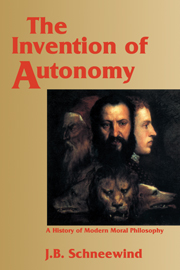Book contents
- Frontmatter
- Contents
- Preface
- Acknowledgments
- A note on references and abbreviations
- Introduction
- Part I The rise and fall of modern natural law
- Part II Perfectionism and rationality
- Part III Toward a world on its own
- Part IV Autonomy and divine order
- 20 Perfection and will: Wolff and Crusius
- 21 Religion, morality, and reform
- 22 The invention of autonomy
- 23 Kant in the history of moral philosophy
- Epilogue
- Bibliography
- Index of names
- Index of subjects
- Index of biblical citations
20 - Perfection and will: Wolff and Crusius
Published online by Cambridge University Press: 05 June 2012
- Frontmatter
- Contents
- Preface
- Acknowledgments
- A note on references and abbreviations
- Introduction
- Part I The rise and fall of modern natural law
- Part II Perfectionism and rationality
- Part III Toward a world on its own
- Part IV Autonomy and divine order
- 20 Perfection and will: Wolff and Crusius
- 21 Religion, morality, and reform
- 22 The invention of autonomy
- 23 Kant in the history of moral philosophy
- Epilogue
- Bibliography
- Index of names
- Index of subjects
- Index of biblical citations
Summary
In the 1720s the theological faculty at the University of Halle was up in arms about the philosophy of Christian Wolff. Their outrage was compounded when they learned that he planned to publish in Latin an expanded version of the metaphysical system he had first written in German. The new book would allow the whole world to learn that antireligious theories were taught at Halle, bringing the university into terrible disrepute. If the theologians thought that foreigners would not read metaphysics in German, their judgment was sound. Even thirty years later Adam Smith could say that “the Germans have never cultivated their own language; and while the learned accustom themselves to think and write in a language different from their own, it is scarce possible that they should either think or write, upon any delicate or nice subject, with happiness or precision.” He added that although the achievements of German academies are known abroad, “it is seldom that the works of any particular man are inquired for.”
Smith's comments reflect a widely held opinion of Germany. It was seen by non-Germans of the eighteenth century as an amorphous conglomerate of innumerable small or medium-sized states, picturesque perhaps but making no contribution to intellectual life. Non-Germans did not think German a language worth knowing. The Germans rapidly translated into their language almost everything of note written in French, and much of what was published in English.
- Type
- Chapter
- Information
- The Invention of AutonomyA History of Modern Moral Philosophy, pp. 431 - 456Publisher: Cambridge University PressPrint publication year: 1997
- 2
- Cited by



